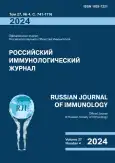Study of the state of humoral immunity to COVID-19 in Arkhangelsk residents
- Authors: Krieger E.A.1, Samodova O.V.1, Samoylikov R.V.2, Shchepina I.V.1,3
-
Affiliations:
- Northern State Medical University
- I. Mechnikov Research Institute of Vaccines and Sera
- Arkhangelsk Regional Clinical Hospital
- Issue: Vol 27, No 4 (2024)
- Pages: 1049-1056
- Section: SHORT COMMUNICATIONS
- URL: https://bakhtiniada.ru/1028-7221/article/view/267926
- DOI: https://doi.org/10.46235/1028-7221-16893-SOT
- ID: 267926
Cite item
Full Text
Abstract
The COVID-19 pandemic caused by SARS-CoV-2 has affected healthcare, society and the economy in all countries, including Russia. Several vaccines have been created as the method for COVID-19 prevention. One of the most widespread vaccines in Russia, which has received international recognition, is the Gam-COVID-Vac (Sputnik V) vaccine and its variant Sputnik Light, which represents its first component. This vaccine, like similar vaccines in many countries, was used during the pandemic. The purpose of this work is to study the humoral immunity status of Arkhangelsk city residents and the effect of vaccination on them. Adult residents of Arkhangelsk [N = 281] were enrolled in the randomized study. Samples from vaccinated people and the control group were collected for the study in October 2022.The median from the time of last vaccination/booster to sample collection was 10 months. The samples were tested for the level of IgG to the receptor-binding domain of the SARS-CoV-2 S protein. The work assessed the humoral immunity status among residents of Arkhangelsk. It was shown that in October 2022 high IgG values were recorded among the people in the studied groups, most likely caused by contact with the SARS-CoV-2 virus. The humoral immunity status of unvaccinated residents, for those who have had COVID-19 and those who have not, is described; a significant increase in the level of IgG among those vaccinated compared to unvaccinated people is shown, despite the fact that the average time after vaccination was more than 10 months. A comparative analysis of IgG levels among different age groups was carried out. The study found no difference in post-vaccination antibody levels among people over 65 years old compared to younger age groups. Also there were no statistically significant differences in antibody levels among unvaccinated people over 65 in respect to younger age groups.
Keywords
Full Text
##article.viewOnOriginalSite##About the authors
E. A. Krieger
Northern State Medical University
Email: Roma_sam78@mail.ru
PhD (Medicine), Associate Professor, Department of Infectious Diseases
Russian Federation, ArkhangelskO. V. Samodova
Northern State Medical University
Email: Roma_sam78@mail.ru
PhD, MD (Medicine), Professor, Head, Department of Infectious Diseases
Russian Federation, ArkhangelskR. V. Samoylikov
I. Mechnikov Research Institute of Vaccines and Sera
Author for correspondence.
Email: Roma_sam78@mail.ru
Reserach Associate, Laboratory of Molecular Immunology
Russian Federation, 5a Maly Kazenny Lane, Moscow, 105064I. V. Shchepina
Northern State Medical University; Arkhangelsk Regional Clinical Hospital
Email: Roma_sam78@mail.ru
PhD (Medicine), Associate Professor, Department of Infectious Diseases, Northern State Medical University; Deputy Chief Physician for Infectious Diseases, Arkhangelsk Regional Clinical Hospital
Russian Federation, Arkhangelsk; ArkhangelskReferences
- Маянский Н.А., Бржозовская Е.А., Стоянова С.С., Фролков А.В., Лебедин Ю.C. Динамика концентрации антител к sars-cov-2 в течение 12 месяцев после перенесенной инфекции covid-19 // Вестник РГМУ, 2022. № 1. С. 12–14. [Mayanskiy N.A., Brzhozovskaya E.A., Stoyanova S.S., Frolkov A.V., Lebedin Y.S. Dynamic changes in the concentrations of anti-SARS-COV-2 antibodies within 12 mounts after recovery from COVID-19. Vestnik RGMU = Bulletin of RSMU, 2022, no. 1, pp. 12-14. (In Russ.)]
- Сметанина С.В., Исаев А.Н., Исаева Ю.О. Нурмухаметова Е.А., Блохина Н.П., Николаев Н.А., Ершов А.В. Изменение уровня антител класса IgG к коронавирусу SARS-CoV-2 (COVID-19) у населения регионов Российской Федерации и в динамике у реконвалесцентов. // Consilium Medicum, 2020. Т. 22, № 11. С. 47-50. [Smetanina S.V., Isaev A.N., Isaeva Yu.O. Nurmukhametova E.A., Blokhina N.P., Nikolaev N.A., Ershov A.V. Change in anti-SarS-cov-2 igG antibodies (covid-19) among the population of the russian Federation regions and in convalescents in dynamics. Consilium Medicum = Consilium Medicum, 2020, Vol. 22, no. 11, pp. 47-50. (In Russ.)]
- Ledesma M.M.G.L., Sanchez L., Ojeda D.S., Rouco S.O., Rossi A.H., Varese A., Mazzitelli I., Pascuale C.A., Miglietta E.A., Rodríguez P.E., Pallarés H.M., Navarro G.S.C., Caramelo J.J., Rothlauf P.W., Liu Z., Bloyet L.-M., Pontelli M.C., Rasetto N.B., Wenker S.D., Ramis L.Y., Bialer M.G., Jose de Leone M., Hernando C.E., Bianchimano L., Ríos A.S., Cienfuegos M.S.T., García D.R.R., Longueira Y., Laufer N., Alvarez D., Ceballos A.,Ochoa V., Monzani C., Turk G., Salvatori M., Carradori J., Prost K., Rima A., Varela C., Ercole R., Toro R.I., Gutierrez S., Zubieta M., Acuña D., Jodar M.S.N., Torres C., Mojsiejczuk L., Viegas M., Velazquez P., Testa C., Kreplak N., Yanovsky M., Whelan S., Geffner J., Pifano M., Gamarnik A.V. Longitudinal Study after Sputnik V Vaccination Shows Durable SARS-CoV-2 Neutralizing Antibodies and Reduced Viral Variant Escape to Neutralization over Time. MBio, 2022, Vol. 13, no. 1, e03442-21. doi: 10.1128/mbio.03442-21.
- Ma H., Zeng W., He H., Zhao D., Jiang D., Zhou P., Cheng L., Li Y., Ma X., Jin T. Serum IgA, IgM, and IgG responses in COVID-19. Cell. Mol. Immunol., 2020, Vol. 17, no. 7, pp. 773-775.
- Pereson M.J., Amaya L., Neukam K., Baré P., Echegoyen N., Badano M.N., Lucero A., Martelli A., Garcia G.H., Videla C., Martínez A.P., Di Lello F.A. Heterologous gam-COVID-vac (sputnik V)/mRNA-1273 (moderna) vaccination induces a stronger humoral response than homologous sputnik V in a real-world data analysis. Clin. Microbiol. Infect., 2022, Vol. 28, no. 10, pp. 1382-1388.
Supplementary files










